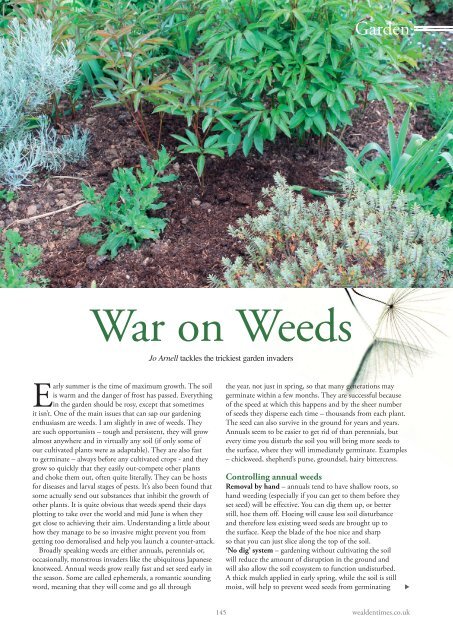Wealden Times | WT184 | June 2017 | Kitchen & Bathroom supplement inside
Wealden Times - The lifestyle magazine for the Weald
Wealden Times - The lifestyle magazine for the Weald
Create successful ePaper yourself
Turn your PDF publications into a flip-book with our unique Google optimized e-Paper software.
Garden<br />
War on Weeds<br />
Jo Arnell tackles the trickiest garden invaders<br />
Early summer is the time of maximum growth. The soil<br />
is warm and the danger of frost has passed. Everything<br />
in the garden should be rosy, except that sometimes<br />
it isn’t. One of the main issues that can sap our gardening<br />
enthusiasm are weeds. I am slightly in awe of weeds. They<br />
are such opportunists – tough and persistent, they will grow<br />
almost anywhere and in virtually any soil (if only some of<br />
our cultivated plants were as adaptable). They are also fast<br />
to germinate – always before any cultivated crops - and they<br />
grow so quickly that they easily out-compete other plants<br />
and choke them out, often quite literally. They can be hosts<br />
for diseases and larval stages of pests. It’s also been found that<br />
some actually send out substances that inhibit the growth of<br />
other plants. It is quite obvious that weeds spend their days<br />
plotting to take over the world and mid <strong>June</strong> is when they<br />
get close to achieving their aim. Understanding a little about<br />
how they manage to be so invasive might prevent you from<br />
getting too demoralised and help you launch a counter-attack.<br />
Broadly speaking weeds are either annuals, perennials or,<br />
occasionally, monstrous invaders like the ubiquitous Japanese<br />
knotweed. Annual weeds grow really fast and set seed early in<br />
the season. Some are called ephemerals, a romantic sounding<br />
word, meaning that they will come and go all through<br />
the year, not just in spring, so that many generations may<br />
germinate within a few months. They are successful because<br />
of the speed at which this happens and by the sheer number<br />
of seeds they disperse each time – thousands from each plant.<br />
The seed can also survive in the ground for years and years.<br />
Annuals seem to be easier to get rid of than perennials, but<br />
every time you disturb the soil you will bring more seeds to<br />
the surface, where they will immediately germinate. Examples<br />
– chickweed, shepherd’s purse, groundsel, hairy bittercress.<br />
Controlling annual weeds<br />
Removal by hand – annuals tend to have shallow roots, so<br />
hand weeding (especially if you can get to them before they<br />
set seed) will be effective. You can dig them up, or better<br />
still, hoe them off. Hoeing will cause less soil disturbance<br />
and therefore less existing weed seeds are brought up to<br />
the surface. Keep the blade of the hoe nice and sharp<br />
so that you can just slice along the top of the soil.<br />
‘No dig’ system – gardening without cultivating the soil<br />
will reduce the amount of disruption in the ground and<br />
will also allow the soil ecosystem to function undisturbed.<br />
A thick mulch applied in early spring, while the soil is still<br />
moist, will help to prevent weed seeds from germinating<br />
<br />
145 wealdentimes.co.uk


















